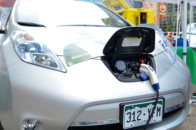COMMERCE CITY, Colo. (August 22, 2013) – Adams County School District 14 (Adams 14) invites the community to celebrate the launch of three environmentally friendly propane school buses. These new buses are the result of funding awarded to Adams 14 by the Regional Air Quality Council (RAQC).
What: Celebration to highlight the new fleet of propane buses in Adams 14
- Free hot dogs, chips, and popsicles
- “Test ride” the new buses
- Informational booths
When: Saturday, Aug. 24, 2013, 11 a.m. to 1 p.m.
Where: Adams City High School, 7200 Quebec Parkway, Commerce City
In 2012, the District applied for and received funding from the RAQC that allowed Adams 14 to replace three older, high-polluting diesel buses with three propane buses. The addition of the new buses will both improve air quality and reduce fuel costs. Adams 14 is just the seventh district in Colorado to introduce propane school buses.
The District’s new buses, which are manufactured by Blue Bird, offer many benefits over conventionally fueled school buses. Not only do they reduce carbon monoxide, nitrogen oxide and total hydrocarbon emissions, but they also virtually eliminate particulate matter. Additionally, noise levels on the buses are decreased by as much as 50 percent when compared to diesel counterparts, which makes it easier to hear the children on board. Fuel costs are also reduced by 40 to 50 percent over diesel buses, and because propane autogas burns cleaner than gasoline or diesel, it results in less engine wear and tear and reduced maintenance costs.
Adams 14 transportation services manager Albert Francisco estimates that replacing the old buses with the new will, on an annual basis, reduce carbon dioxide (CO2) emissions by 35,800 pounds, save $12,000 in fuel cost and positively impact on-board interaction.
“We are pleased to offer improved air quality to our children and our community, as well as significant cost savings to our district, with the addition of these cleaner propane buses,” said Francisco. “We are grateful to the support of the RAQC in helping us make this happen.”
“Both the students and the drivers love the reduced noise,” Francisco continued. “And, because students don’t have to yell at each other to be heard, there is actually a decrease in student management issues.”
The District took possession of the buses in May; students began experiencing the new buses for the first time at the start of the new school year on August 12.
About Adams 14:
Adams 14 is Colorado’s 26th largest school district, and serves more than 7,500 students annually. Nestled in the historic community of Commerce City, Adams 14 strives to ensure academic success for every student by providing highly effective classroom instruction, supplemental enrichment opportunities and parent/family collaboration opportunities. To learn more about Adams 14, visit adams14.org.
About the Regional Air Quality Council:
The Regional Air Quality Council (RAQC) is the lead air quality planning agency for the seven‐county Denver metropolitan area. The Council’s main purpose is to develop plans and programs to keep the region in compliance with federal air quality standards, with significant input from area citizens, business, and local governments. The RAQC also develops and implements initiatives to help public and private on and off road operators voluntarily reduce emissions and fuel consumption. To learn more about the RAQC, visit www.raqc.org.
# ### #


